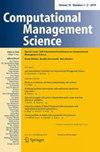A constrained swarm optimization algorithm for large-scale long-run investments using Sharpe ratio-based performance measures
IF 1.3
Q3 SOCIAL SCIENCES, MATHEMATICAL METHODS
引用次数: 0
Abstract
Abstract We study large-scale portfolio optimization problems in which the aim is to maximize a multi-moment performance measure extending the Sharpe ratio. More specifically, we consider the adjusted for skewness Sharpe ratio, which incorporates the third moment of the returns distribution, and the adjusted for skewness and kurtosis Sharpe ratio, which exploits in addition the fourth moment. Further, we account for two types of real-world trading constraints. On the one hand, we impose stock market restrictions through cardinality, buy-in thresholds, and budget constraints. On the other hand, a turnover threshold restricts the total allowed amount of trades in the rebalancing phases. To deal with these asset allocation models, we embed a novel hybrid constraint-handling procedure into an improved dynamic level-based learning swarm optimizer. A repair operator maps candidate solutions onto the set characterized by the first type of constraints. Then, an adaptive $$\ell _1$$基于夏普比率绩效指标的大规模长期投资约束群优化算法
摘要研究了大规模投资组合优化问题,该问题的目标是最大化扩展夏普比率的多矩绩效指标。更具体地说,我们考虑了经偏度调整的夏普比,它包含了收益分布的第三矩,以及经偏度和峰度调整的夏普比,它还利用了第四矩。此外,我们考虑了两种现实世界的交易约束。一方面,我们通过基数、买入阈值和预算约束来施加股票市场限制。另一方面,成交量阈值限制了再平衡阶段允许的交易总量。为了处理这些资产配置模型,我们将一种新的混合约束处理过程嵌入到改进的基于动态水平的学习群优化器中。修复算子将候选解映射到以第一类约束为特征的集合上。然后,用一个自适应的$$\ell _1$$ - 1精确惩罚函数来管理周转违规。本文的重点是强调在长期投资的绩效衡量中包括高阶时刻的重要性,特别是当市场动荡时。我们对两组全球范围内的资产进行了实证测试,以说明所提出策略的可扩展性和有效性,并与最大化夏普比率的策略相比,评估我们的投资绩效。
本文章由计算机程序翻译,如有差异,请以英文原文为准。
求助全文
约1分钟内获得全文
求助全文
来源期刊

Computational Management Science
SOCIAL SCIENCES, MATHEMATICAL METHODS-
CiteScore
1.90
自引率
11.10%
发文量
13
期刊介绍:
Computational Management Science (CMS) is an international journal focusing on all computational aspects of management science. These include theoretical and empirical analysis of computational models; computational statistics; analysis and applications of constrained, unconstrained, robust, stochastic and combinatorial optimisation algorithms; dynamic models, such as dynamic programming and decision trees; new search tools and algorithms for global optimisation, modelling, learning and forecasting; models and tools of knowledge acquisition.
The emphasis on computational paradigms is an intended feature of CMS, distinguishing it from more classical operations research journals.
Officially cited as: Comput Manag Sci
 求助内容:
求助内容: 应助结果提醒方式:
应助结果提醒方式:


